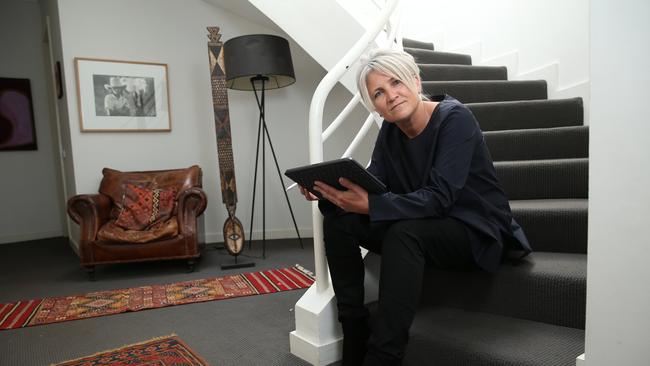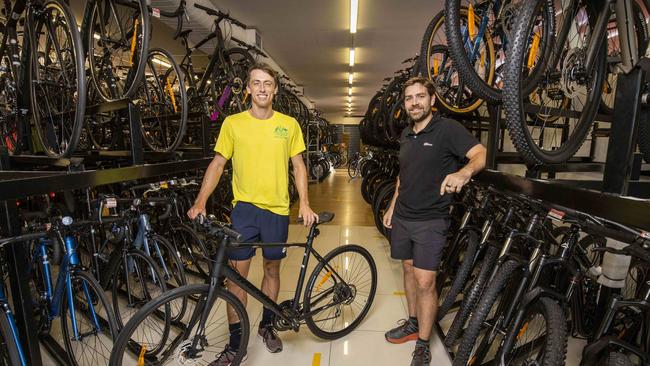Amid the coronavirus carnage some businesses are doing well
In the face of widespread job losses and tanking share prices, some businesses have found opportunity amid the outbreak.

For a handful of companies, the mantra of “never waste a good crisis” is ringing true even as coronavirus ravages the global economy. Amid widespread job losses and tanking share prices, some businesses have found opportunity amid the outbreak.
For some — the supermarkets that were on the receiving end of the panic buying frenzy, the retailers selling home office equipment and chest freezers — the events of the past few weeks have given them a sugar-hit they will help them navigate through the recession ahead.
And for a select few, the events could be the catalyst for a permanent change in the way they interact for their customers.
Among the latter is Marley Spoon, a meal kit delivery service that, amid one of the deepest share market sell-downs in memory, has seen its shares more than double in the past month and has taken on hundreds of extra workers around the world as it tries to keep up with an enormous leap in demand.
Marley Spoon chief executive Fabian Siegel told The Australian that the surge for meal kit deliveries meant the company was now expected to become profitable faster than previously expected.

“Suddenly demand has been surging; there’s unprecedented demand for our product,” he said.
He also hopes the experience of customers over the crisis will “catapult” the business as they make a permanent switch to online food shopping even after the coronavirus crisis subsides.
Before the outbreak, he said, online shopping represented just 2-3 per cent of the total grocery market. That is well below the 20-40 per cent online penetration in other consumer sectors, and closing that gap even partially would be a huge boost for Marley Spoon’s prospects.
“I do believe there’s a high chance this behaviour will not go back,” he said.
Similarly, the coronavirus could end up accelerating the pace at which classrooms adopt online learning programs.
3P Learning, the company that runs online teaching programs such as Mathletics and Reading Eggs that are proving the saviour for parents now home-schooling their children, has also seen a leap in demand for its services.
3P chief executive Rebekah O’Flaherty told The Australian that the firm has grown its staff by more than 10 per cent in the past week, has released 10,000 new activities and has started running daily webinars to help bring teachers up to speed on remote learning after finding only 22 per cent of teachers felt they were prepared for the change.
The increasing number of school children now staying home due to coronavirus will generate unprecedented for online services such as those developed by 3P, but Ms O’Flaherty said the group saw its short-term and long-term role as supporting teachers rather than supplanting them.
“Among the education community globally, it was only a few years ago that the debate stopped around whether digital was right for the classroom,” she said. “Our view is always that it isn’t just digital, you’ve got to have a blended approach. This idea that you plug your kid into a computer isn’t the world that we subscribe to.”
A look at the list of best-performed stocks on the ASX over the past month shows a clear theme — almost anything related to food, freight, online or healthcare has largely weathered the sell-down.
Beyond the early frenzy that stripped the shelves at Coles and Woolworths, the likes of ASX-listed JB Hifi, Harvey Norman and Super Retail, which owns Supercheap Auto, camping store BCF and Rebel Sports have all reported at least some short-term benefits from the uncertainty.
JB Hifi earlier this week said it had seen a 9.1 per cent jump in sales since January at its namesake stores and a 10.4 per cent jump in sales growth at The Good Guys stores it owns, while Harvey Norman said earlier this month that its Australian stores had experienced a 9.1 increase in total sales.
Their experiences are a far cry from the experiences of the likes of Premier Investments — whose chains include Just Jeans, Portmans, Dotti, Peter Alexander and Smiggle — which on Thursday announced the loss of 9000 jobs as a result of closing all its stores.
Shoe retailer Accent Group, the owner of The Athlete’s Foot, Platypus and year, also on Thursday said it would stand down more than 5000 workers and close all of its 500 stores.
Super Retail, meanwhile, told investors on Thursday that its Supercheap and Rebel stores had also recorded growth in sales this year. In the past five weeks alone, Supercheap’s sales grew 7.5 per cent.
The company’s Supercheap Auto and BCF stores hold all the essentials a doomsday prepper needs, while Rebel Sports has benefited from consumers loading up on home fitness gear as gyms shut down.
The country’s largest bicycle retailer, 99 Bikes, has seen a 20-40 per cent jump in business in the past few months that it has attributed to the coronavirus outbreak.
The company is 48 per cent-owned by national travel agency Flight Centre — 99 Bikes’ managing director Matt Turner is the son of Flight Centre founder and chief executive Graham Turner — and is now looking to enlist some of the 3800 Flight Centre staff who were stood down following the swift plunge in travel.
Matt Turner told The Australian that the company had seen an influx in demand from people who were no longer willing to run the risk catching public transport or taxis in light of coronavirus, as well as people looking for fitness options following the closure of the nation’s gyms. It could also, he hopes, spawn a whole new generation of cycling addicts.
The company, which has 47 stores around the country, is looking to hire at least 70 people to help meet the burst of demand.
“We are working with Flight Centre in particular, with the staff they’re laying off, because it works quite well because they’re standing them down temporarily and we want to get them on at least temporary basis,” he said.
Among those buying bikes as a result of the outbreak was tennis star John Millman, who picked up his new bike from a 99 Bikes store in Queensland on Thursday.
Millman, who would normally spend more than half his year travelling on the tennis circuit, doesn’t own a car but was concerned about the risks of catching Ubers to and from training. The bike will also help him keep fit while the ATP tennis tour is on hiatus.




To join the conversation, please log in. Don't have an account? Register
Join the conversation, you are commenting as Logout